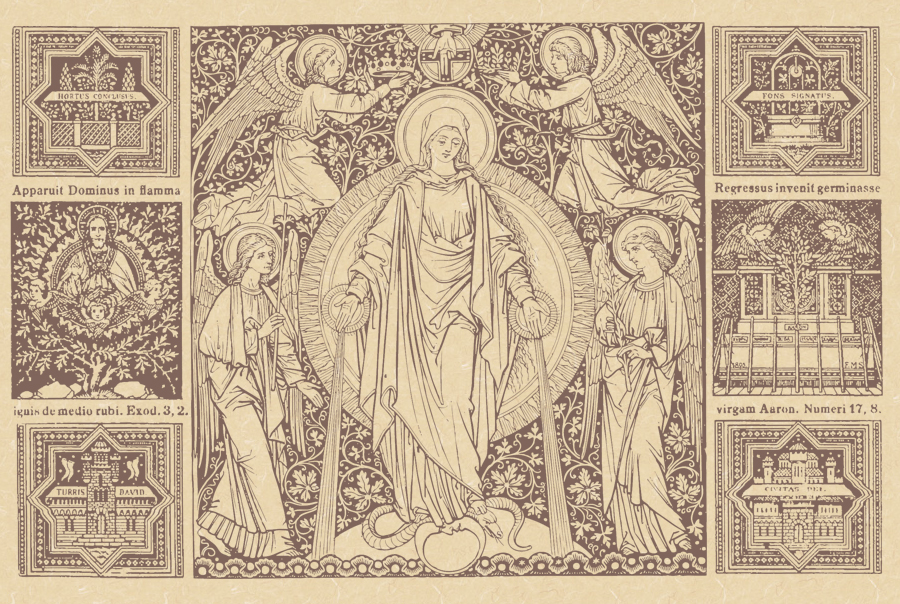Where is That in the Bible?
The Solemnity of the Immaculate Conception.*
Lessons from the proper, according to the ordinary form of the Roman Rite:
• Genesis 3: 9-15, 20.
• Psalm 98: 1-4.
• Ephesians 1: 3-6, 11-12.
• Luke 1: 26-38.
The First Class Feast of the Immaculate Conception of the Blessed Virgin Mary; and, the Commemoration of the First Saturday of Advent.**
Lessons from the proper, according to the extraordinary form of the Roman Rite:
• Proverbs 8: 22-35.
• [Gradual] Benedicta et venerábilis es…***
• Luke 1: 26-28.
FatherVenditti.com
|
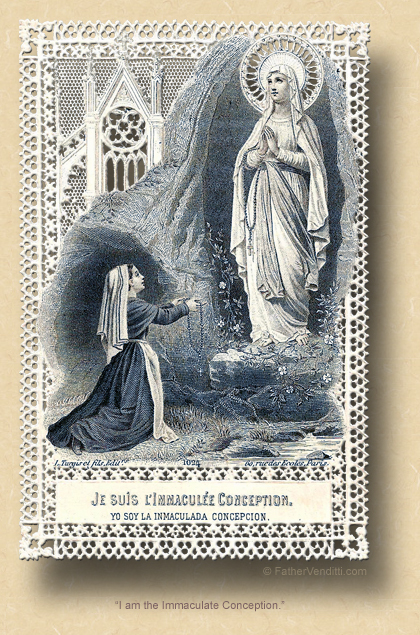 3:04 PM 12/8/2021 — The Dogma of the Immaculate Conception has its roots in Sacred Scripture, was elucidated most eloquently by many Fathers of the Church,—particularly Saint John of Damascus, whose memorial we observed just five days ago—mentioned by our Lady Herself at Lourdes, and finally proclaimed infallibly by Pope Blessed Pius IX in 1854. Believe it or not, I've found—and perhaps you have, too—that many Catholics make the mistake of thinking the Immaculate Conception has something to do with the conception of our Blessed Lord in the womb of the Virgin Mary. But the Immaculate Conception does not refer to our Lord's miraculous conception in the incarnation; rather, it refers to the conception of Mary in the womb of Her mother, Saint Anne. In fact, in the Byzantine Church, where I served as a priest for many years, the feast of the Immaculate Conception is actually called the feast of the Maternity of Saint Anne. 3:04 PM 12/8/2021 — The Dogma of the Immaculate Conception has its roots in Sacred Scripture, was elucidated most eloquently by many Fathers of the Church,—particularly Saint John of Damascus, whose memorial we observed just five days ago—mentioned by our Lady Herself at Lourdes, and finally proclaimed infallibly by Pope Blessed Pius IX in 1854. Believe it or not, I've found—and perhaps you have, too—that many Catholics make the mistake of thinking the Immaculate Conception has something to do with the conception of our Blessed Lord in the womb of the Virgin Mary. But the Immaculate Conception does not refer to our Lord's miraculous conception in the incarnation; rather, it refers to the conception of Mary in the womb of Her mother, Saint Anne. In fact, in the Byzantine Church, where I served as a priest for many years, the feast of the Immaculate Conception is actually called the feast of the Maternity of Saint Anne.
The Mother of God was conceived in the normal way. The Immaculate Conception of the Blessed Virgin Mary does not mean that the physical act of her conception was miraculous in any way; unlike our Blessed Lord, who did not have a human father and whose Mother conceived Him without losing her virginity, the Blessed Virgin did have a human father, and Her mother, Anne, was not a virgin. What was miraculous about the conception of our Lady in the womb of Her mother, Anne, was not how it happened, but the fact that she was conceived without any stain of original sin. And here is where people's eyes start to gloss over and they get confused, because, even though every one of us here, being faithful Catholics, would all swear to a man (or woman) that we believe in the doctrine of Original Sin with all our hearts—after all, it's why we have our children baptized—we so often live our lives as if we don't believe it. Why does evil seem to always thrive in the world? Why do decadence and debauchery seem to hold sway over our society, lead our children astray, even tempt and entice ourselves? Why have we stopped to wage the spiritual combat that came second nature to saints and martyrs of previous generations? Because we have forgotten our fallen nature. 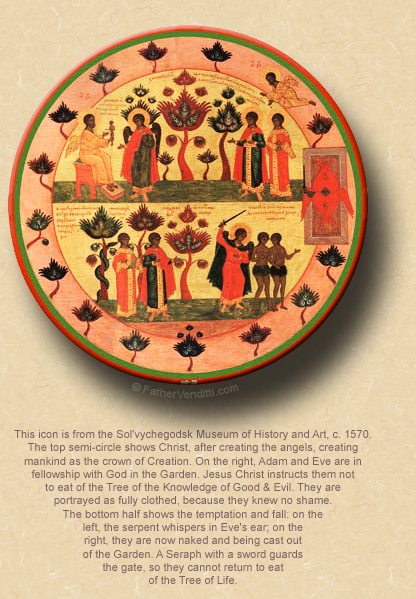 Because a misguided catechesis, born from a misinterpretation of a great ecumenical council, has fooled us into forgetting that we are born at war with the world. Because a misguided catechesis, born from a misinterpretation of a great ecumenical council, has fooled us into forgetting that we are born at war with the world.
In the Book of Genesis, how is the tree in the Garden of Eden described? It is called the Tree of the Knowledge of Good and Evil. It's a metaphorical tree; the fruit on that tree symbolizes the authority of God to decide the difference between right and wrong: things are right and wrong, good and bad, because God says so. By eating the fruit off the Tree of the Knowledge of Good and Evil, man attempts to take that authority away from God and give it to himself, so that he, man, becomes the one to decide for himself what's right and what's wrong. That's why it's called the Original Sin: because all other sins are derived from it. Every sin that we can commit is basically the same: it reflects a desire on our part to decide for ourselves what's right and what's wrong. When Adam eats the fruit off the Tree of the Knowledge of Good and Evil, he's trying to become God. He is saying to God, “You will no longer tell me what's right and what's wrong; I'll do that for myself.” Every time we willfully commit a sin, we are saying to God, “It's none of your business, God, to tell me that this is wrong. I have decided that it's right for me, so I will do it anyway.” We are trying to be God.
And even though the sacrament of baptism restores the grace lost by our first parents in the Original Sin, we are still infected with its effects, which is why, even after baptism, we are tempted, and we sin. It would be nice if baptism would simply restore everything to the way it was before the Original Sin was committed, but it doesn't work that way. We are rational creatures, created with a free and open will, which means that our souls, once robbed of Sanctifying Grace, while they can have that Grace restored to them, still suffer from the effects of having been deprived of it.
When I was nine years old, I came down with Scarlet Fever; and, even to this day, whenever I have a chest x-ray, I have to produce documentation to prove to everyone that I don't have cancer or something because the scar tissue on my lung is still clearly visible. The Original Sin with which we are born scars our souls in just this way: that even when the disease of the sin is taken away by baptism, we still feel the symptoms of the disease. 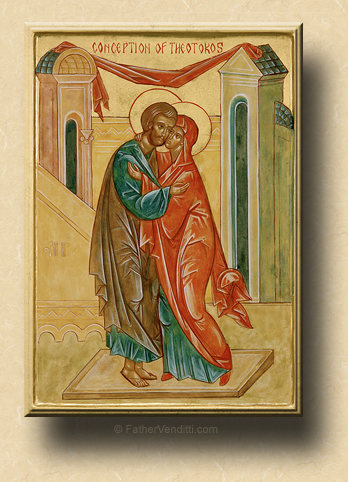 We are still tempted to sin. We are still subject to the whim of the devil. We do not enjoy the friendship that God had with Adam and Eve before the fall. We are still tempted to sin. We are still subject to the whim of the devil. We do not enjoy the friendship that God had with Adam and Eve before the fall.
Look at it this way: a dear friend of yours betrays you, or perhaps even your husband or your wife, and the two of you become estranged for a long period of time; then, you both come to your senses and, filled with love and forgiveness and Christian Charity, you make up and restore your friendship; but, in the back of your mind you know that you will never fully trust that person again. The relationship is restored, the friendship is resumed or the marriage is preserved, but it won't be exactly as it was before; it will always be damaged. Original Sin separates us from the friendship of God, and baptism restores that friendship; but, no matter how close to God we may become through prayer and the Grace of the Sacraments, we can never fully trust in God again. When we read the book of Genesis, and envy the relationship that Adam had with God before the fall, walking together side-by-side in the cool of the evening, we know we will never have that, just as Adam never had it again after he ate the apple, after he ate the fruit off the Tree of the Knowledge of Good and Evil. When God became a Man and died to pay for that sin, Adam, like the rest of us, had his disease cured; but, like the rest of us, he never had it exactly the way it was before because, even though the disease was cured, the scar never goes away.
Which brings us back to the Immaculate Conception of the Blessed Virgin Mary in the womb of her own mother, Saint Anne. God cured the disease of the Original Sin by becoming a Man and dying a real death; but, to become a Man He had to have a mother; but, even as a Man, He's still God, which means that the mother who gives Him birth will be giving to Him her own flesh and blood. Which poses a problem: as Man, God must have a human mother, but as God, that human mother cannot have flesh that carries the scar of the disease of the Original Sin. So, what does God do? He prepares His way to earth by causing to be conceived, in the normal way, a Woman without the scar of the Original Sin: the only human person, besides Himself, ever conceived in this condition. The Immaculate Conception was necessary because Jesus is God.
The Protestants say, most of them, that Jesus is God; but, they deny the Immaculate Conception, claiming that they can't find it in the Bible. It's there, of course: it starts with the Book of Genesis and ends with birth of our Lord. It is impossible to deny the Immaculate Conception of the Blessed Virgin Mary and still believe that Jesus is God. In fact, when you think about it, a person who doesn't believe in the Immaculate Conception isn't really a Christian.
And, of course, it's not surprising that those who deny the Immaculate Conception of the Blessed Virgin Mary also deny the very existence of the Original Sin. 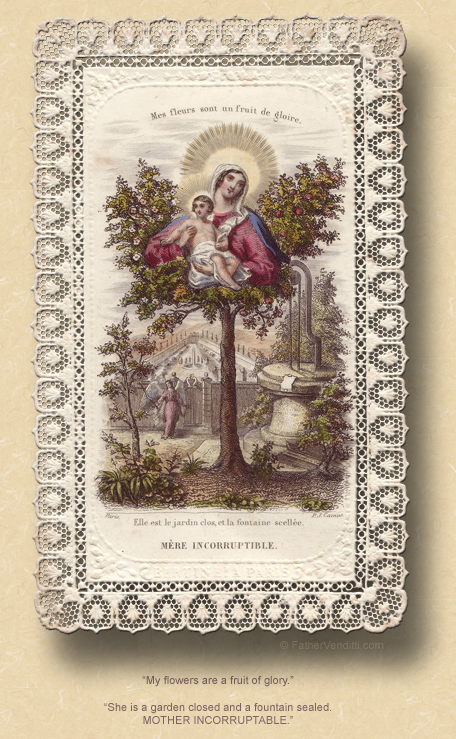 Oh, they don't deny that Adam committed the sin; they just deny we carry the scars. This usually comes from taking a fundamentalist approach to the Bible, believing that there actually was an historical person named Adam, with an historical wife named Eve, who gave her husband an historical apple off of an historical tree that God, for some purely arbitrary reason, decided he didn't want anyone picking fruit from. The irony in all this is that people will fall into taking a fundamentalist approach to the Sacred Scriptures out of an exaggerated love and devotion for the Bible, but it's that very fundamentalist approach that ends up causing them to deny the basic truths of the faith that God inspired Moses to write the Book of Genesis to teach us. Oh, they don't deny that Adam committed the sin; they just deny we carry the scars. This usually comes from taking a fundamentalist approach to the Bible, believing that there actually was an historical person named Adam, with an historical wife named Eve, who gave her husband an historical apple off of an historical tree that God, for some purely arbitrary reason, decided he didn't want anyone picking fruit from. The irony in all this is that people will fall into taking a fundamentalist approach to the Sacred Scriptures out of an exaggerated love and devotion for the Bible, but it's that very fundamentalist approach that ends up causing them to deny the basic truths of the faith that God inspired Moses to write the Book of Genesis to teach us.
We must never forget how blessed we all are to share in this Catholic Faith that gives us the fullness of the truth. What a consolation it is to contemplate how desperate God was to redeem us that He transcended the very natural laws He Himself had created in order to make that redemption possible! And how much love we owe to that Woman conceived without sin, without whose willingness to submit to God’s plan, God would not have become man, and that redemption would have been withheld from us. That’s why, if we love Jesus, we must also love His Mother, because without His Mother, there would have been no Jesus for us to love.

* Today is the Patronal Feastday of the United States of America.
** In the extraordinary form during Advent, whenever a feast is observed, the feria is commemorated, but a Mass is not permitted for this commemoration; rather, the commemoration is made at Mass by an additional Collect, Secret and Postcommunion added to those of the feast. The commemoration is made at Lauds and Vespers by adding an additional antiphon, verse and Collect to those of the feast.
*** The Gradual is non-Scriptural: "Blessed and venerable art Thou, O Virgin Mary: Who without blemish to Thy maidenhood, wert found to be the Mother of the Saviour. O Virgin, Mother of God, He Whom the whole world cannot contain, enclosed Himself in Thy womb and became Man."
|
